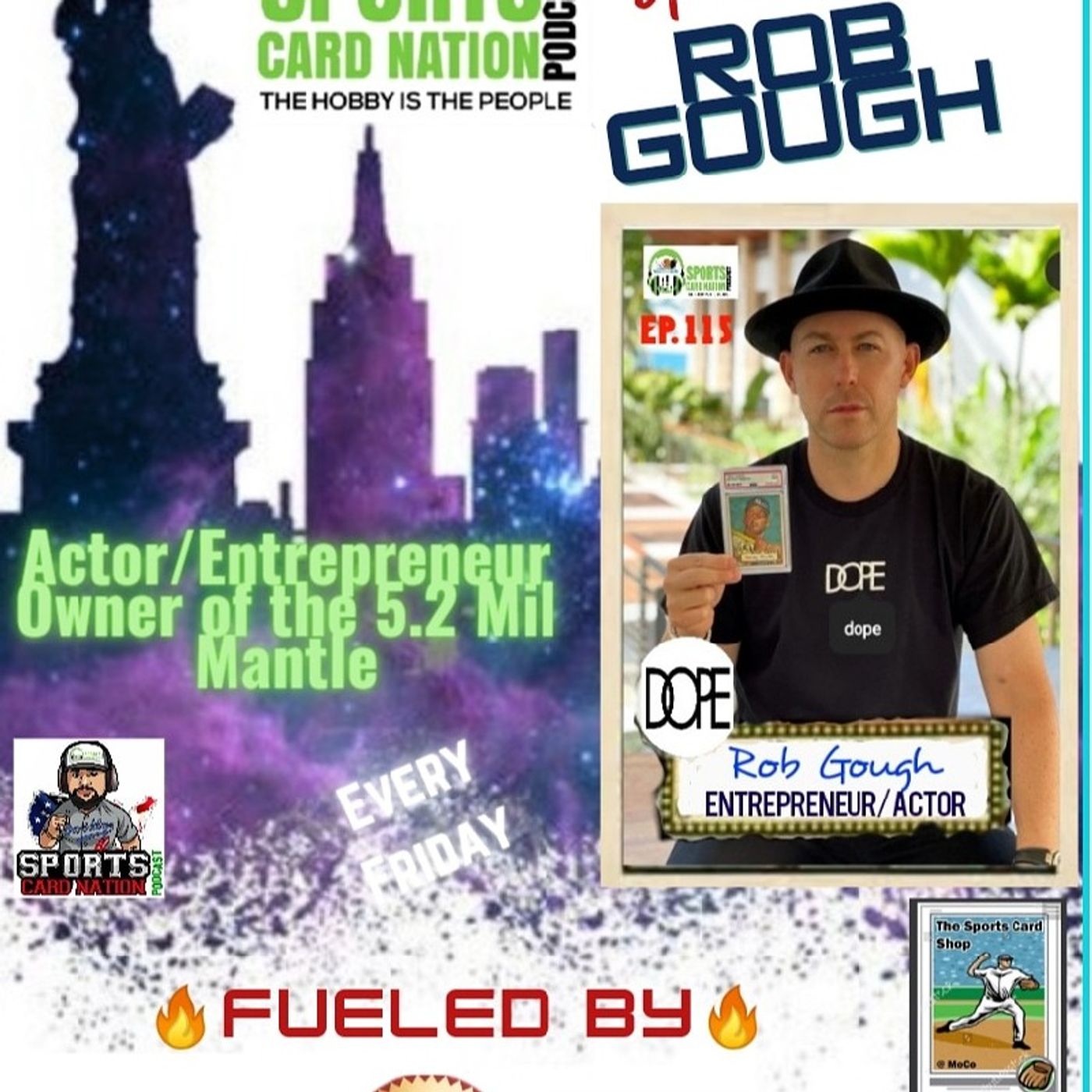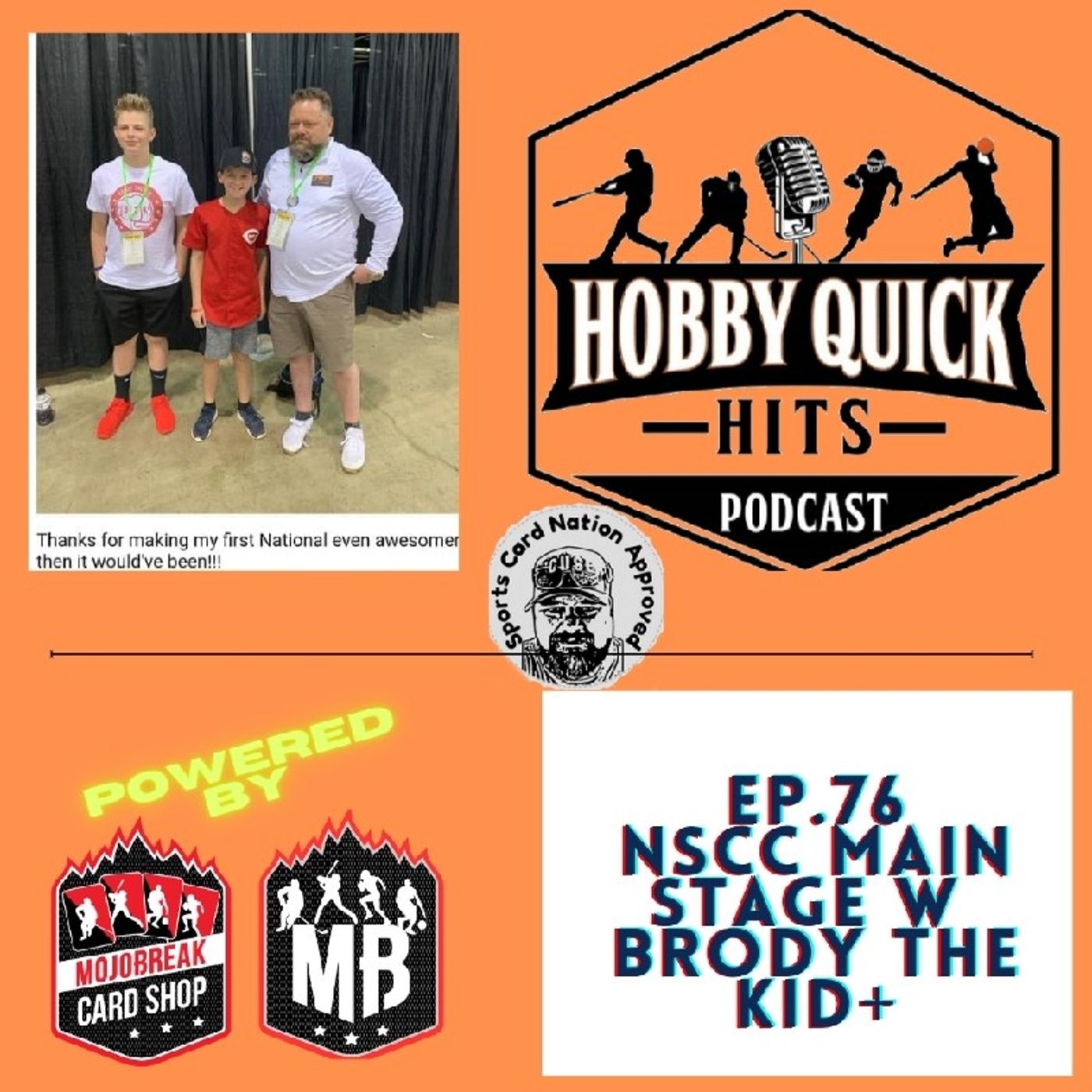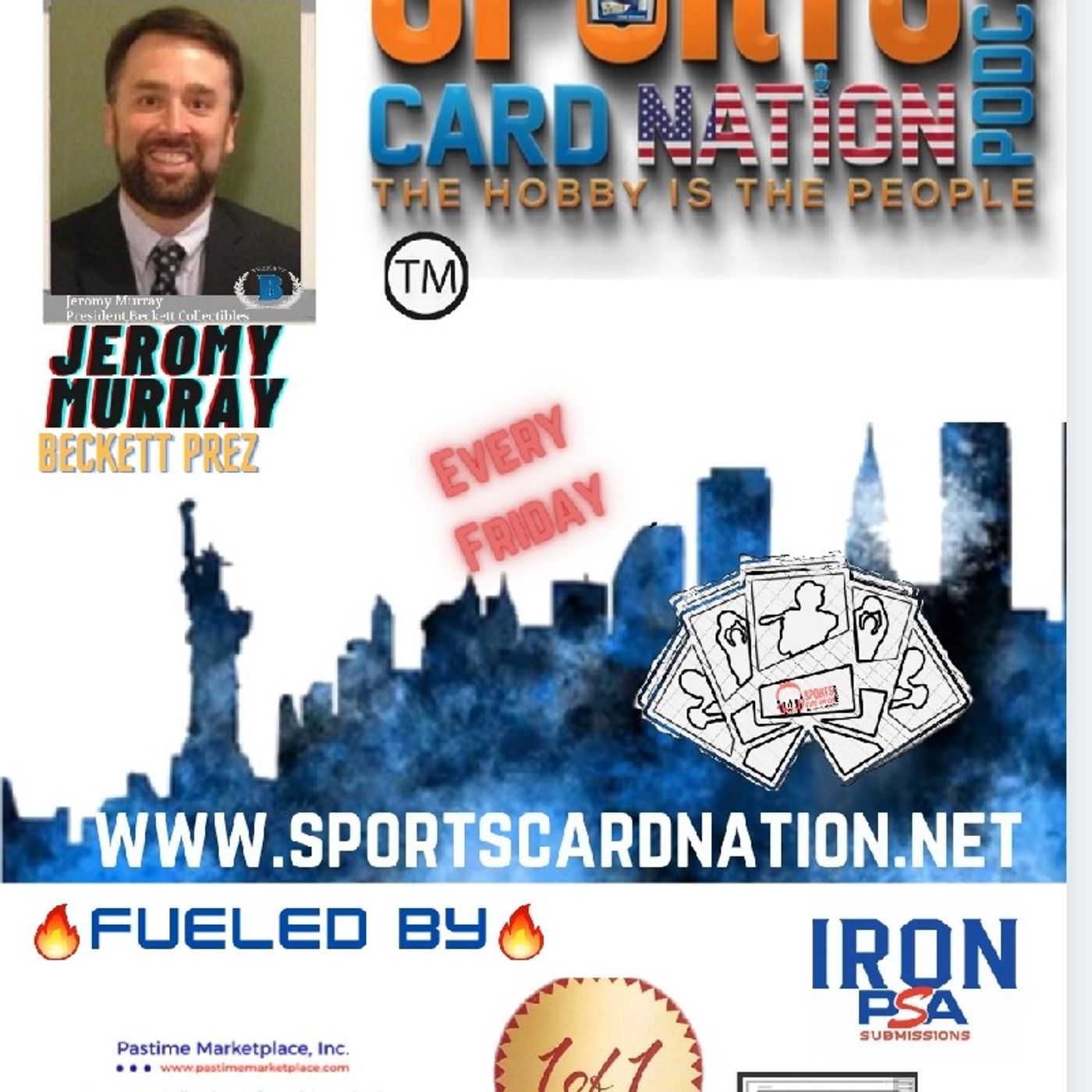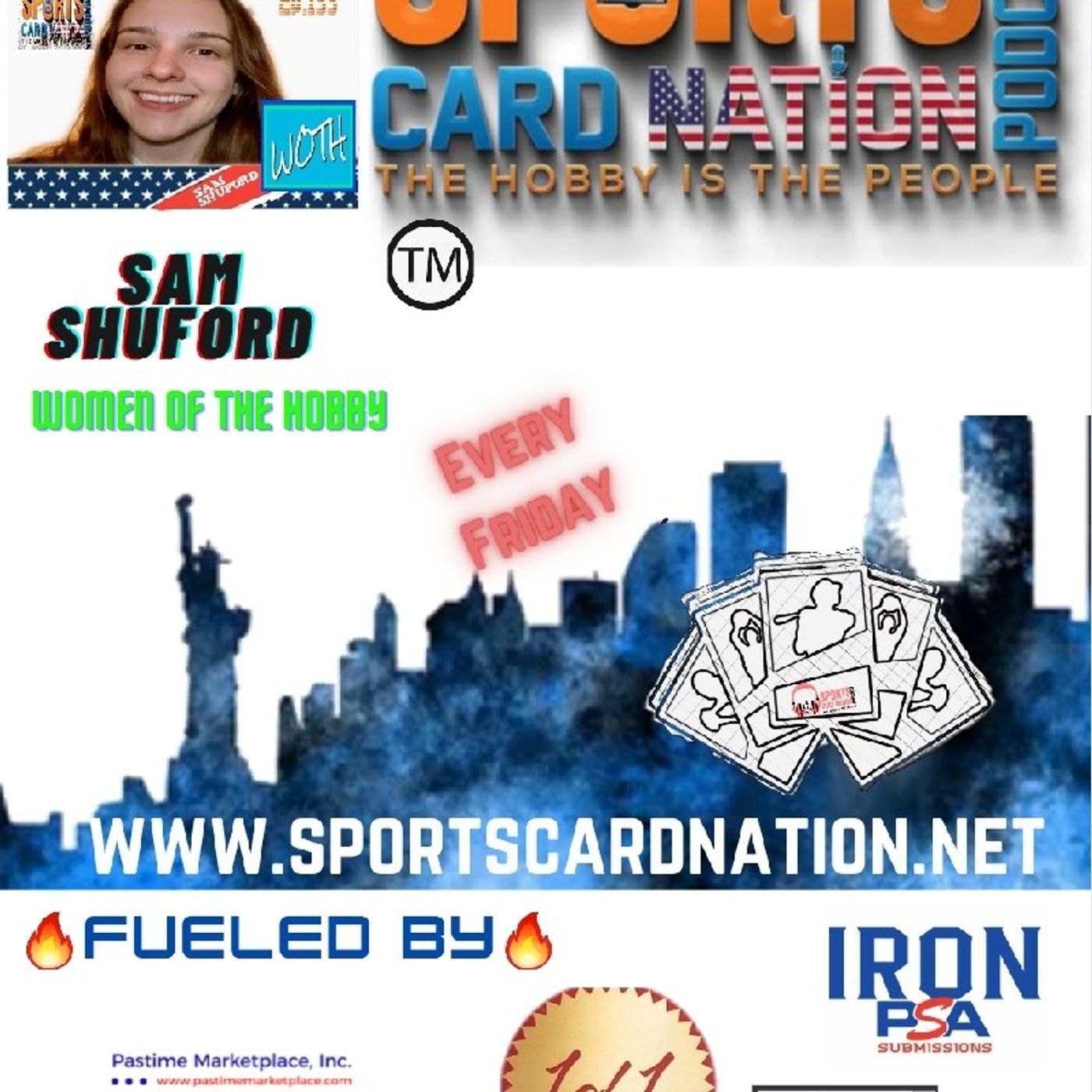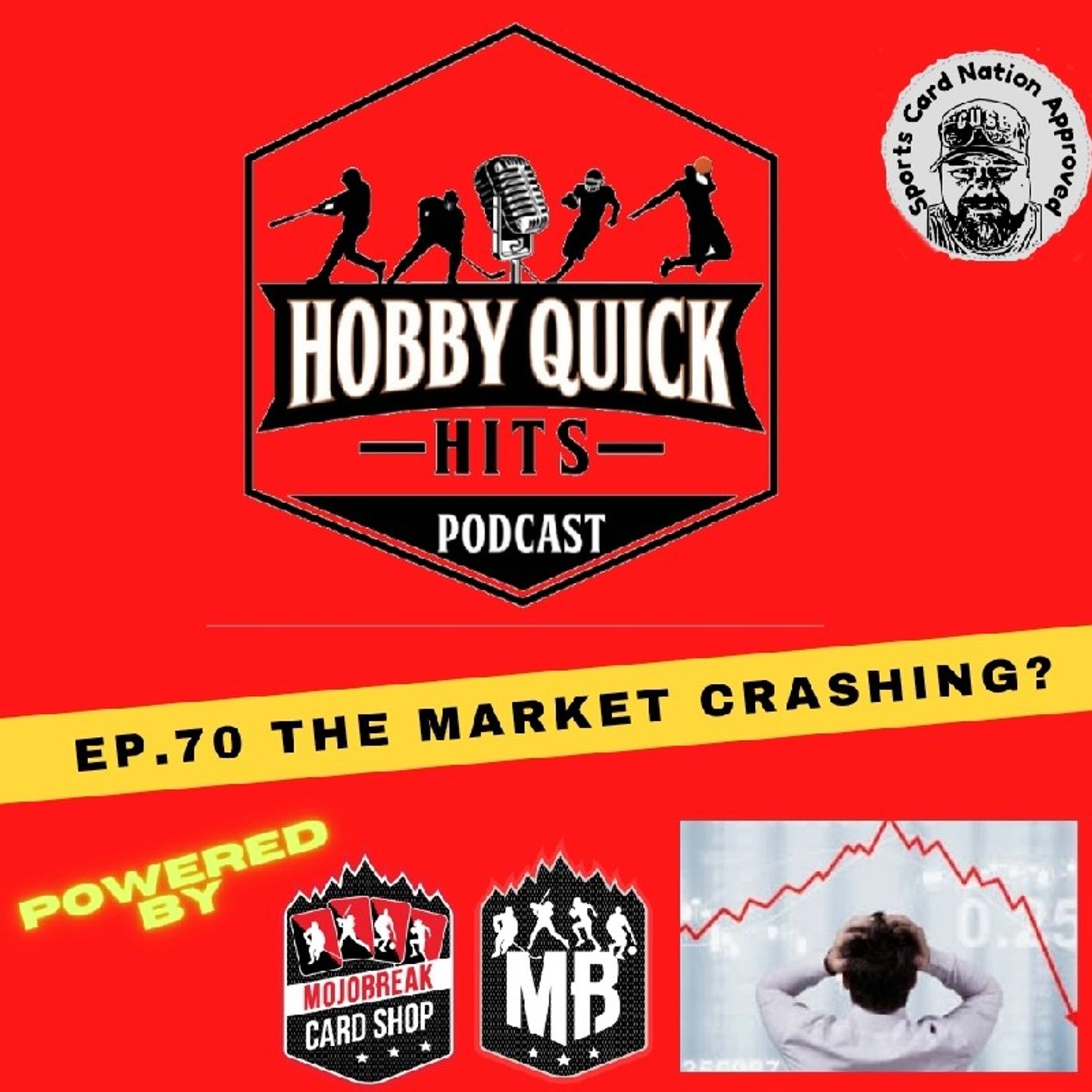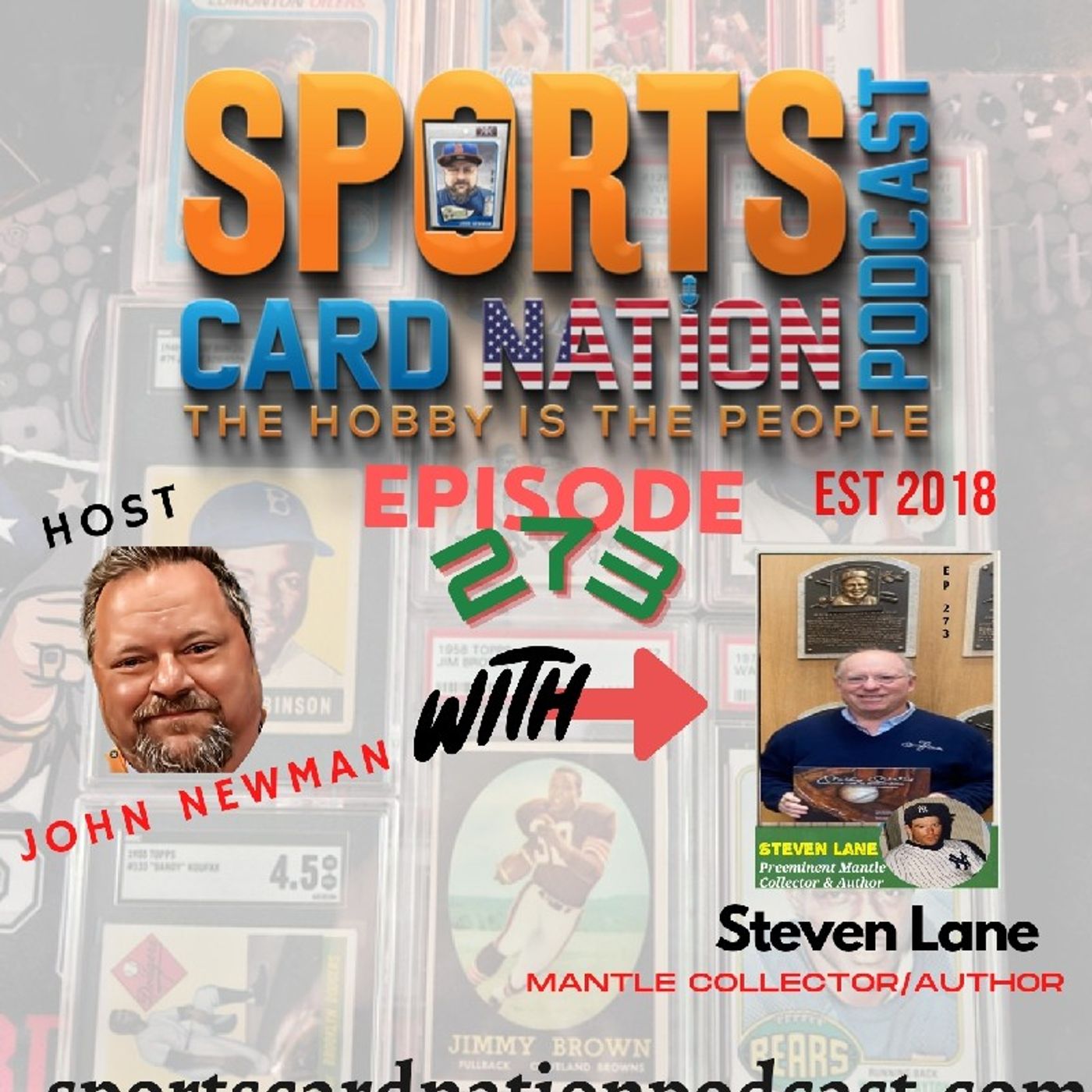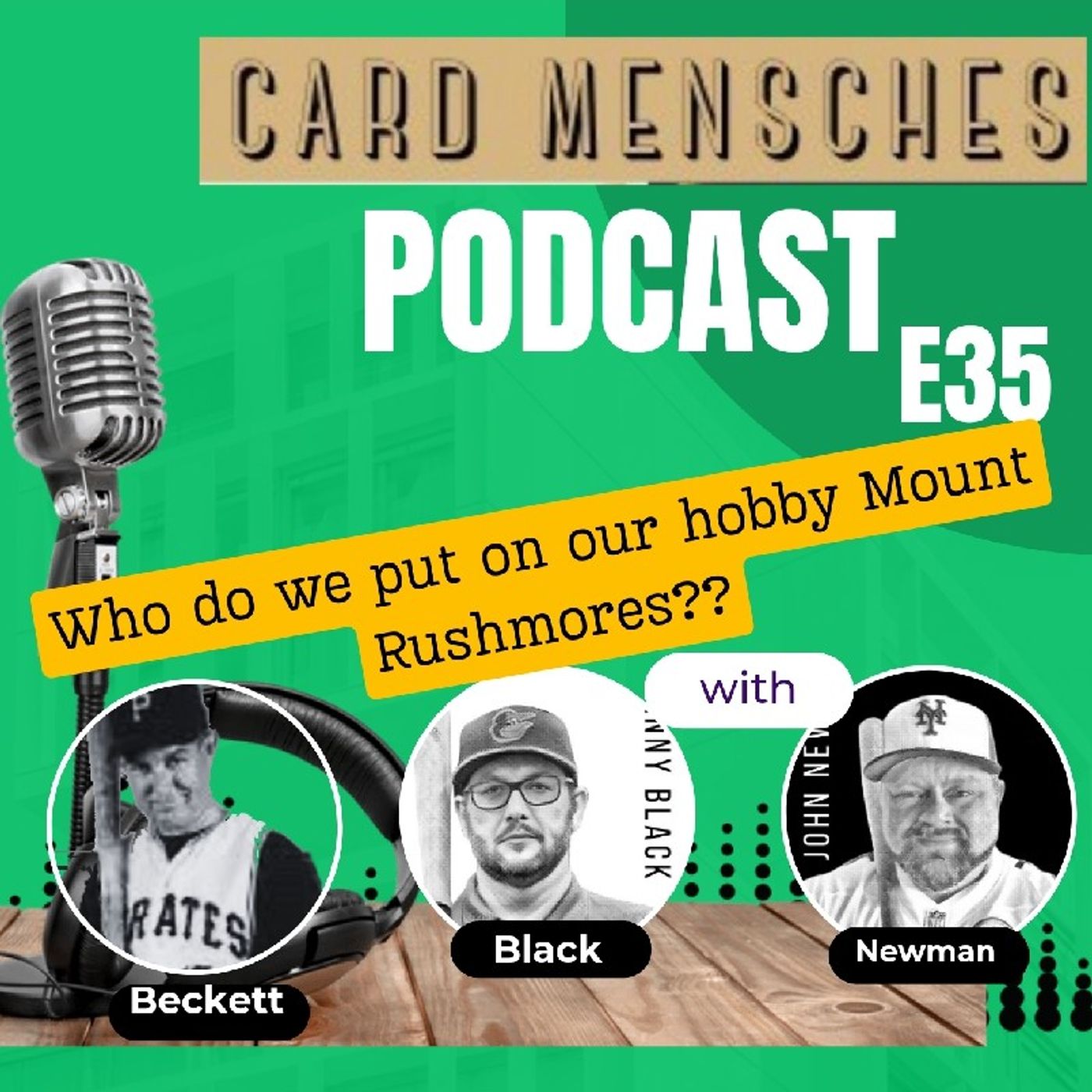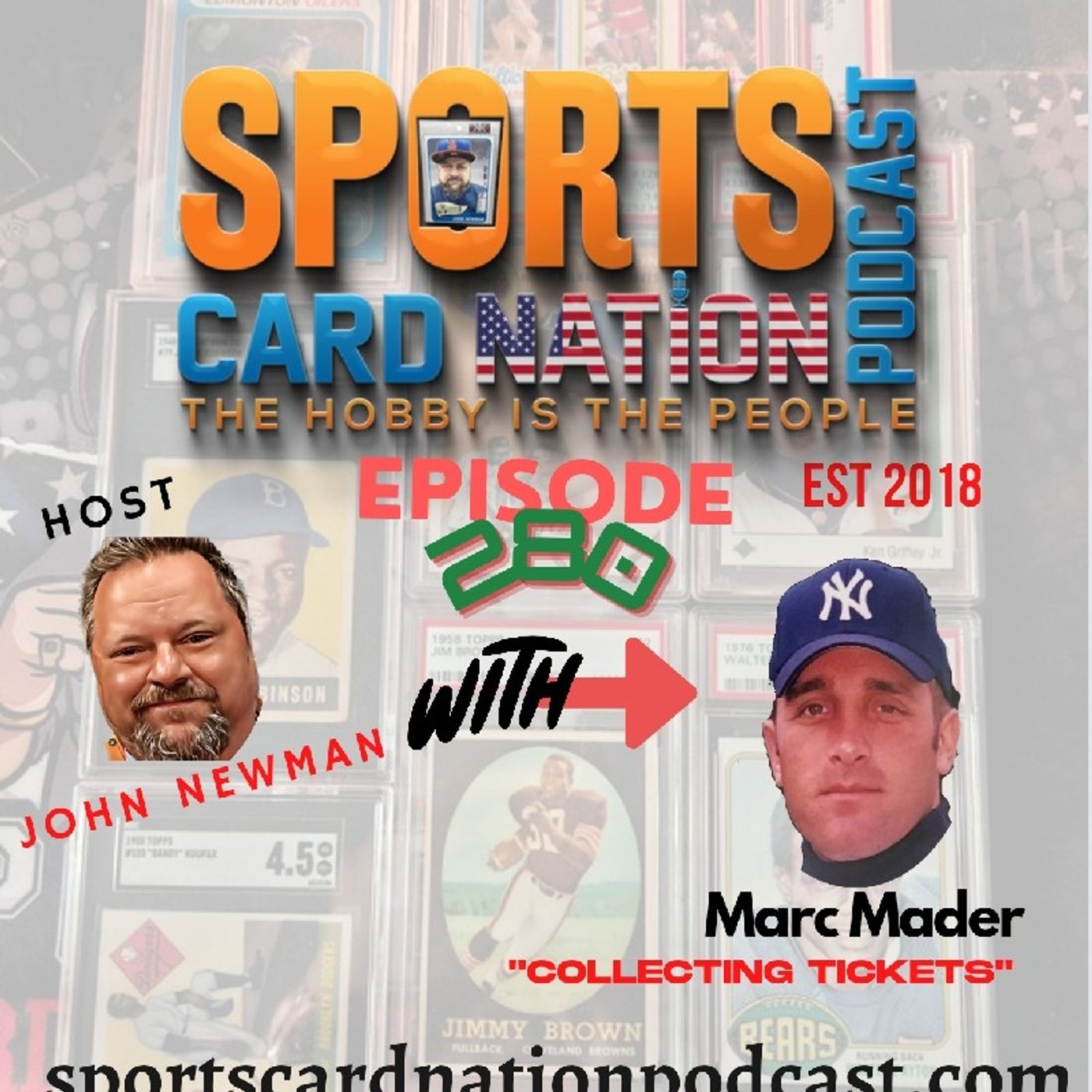Ep.214 w/ Andy Friedman-Topps Spotlight 70 & highlighting the underdogs
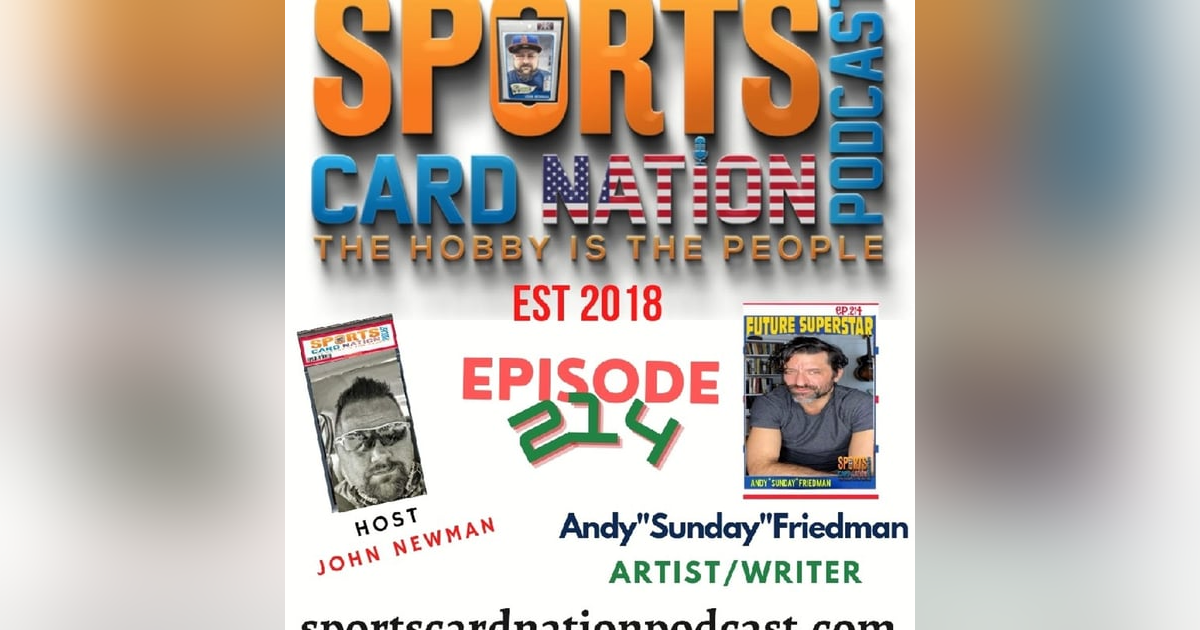
Andy "Sunday" Friedman loves the underdog. He is a writer, musician and an artist but he'll tell you he's just an artist. Bottom line he's Uber talented. He joins us to discuss his career and how he got involved in the Topps Spotlight 70....
Andy "Sunday" Friedman loves the underdog. He is a writer, musician and an artist but he'll tell you he's just an artist. Bottom line he's Uber talented. He joins us to discuss his career and how he got involved in the Topps Spotlight 70.
Follow us on Social Media:
Website:
https://www.sportscardnationpo...
https://linktr.ee/Sportscardna...
Become a supporter of this podcast: https://www.spreaker.com/podcast/sports-card-nation-podcast--4761791/support.
I'm excited to talk to my next guest on the sports card shop guest line this
0:32
next gentleman is multi-talented writer musician artist I probably left
0:38
something off he's Wroten for the New York Times the New Yorker S.I other
0:45
other Publications not mentioned but without further Ado Let's uh welcome
0:50
Andy Sunday Freeman to the show hey thank you thanks John thanks for
0:55
having me nice to be here thank you for joining us uh I got to ask you is there anything you can't do
1:02
I don't know yet I haven't tried everything yeah that's uh you know I get I have an
1:09
idea where you got the the Sunday uh moniker but uh for those that may not
1:14
know or I might be guessing wrong well where where did that come from oh there came a point in my life right
1:22
around the time I guess I signed on Instagram where I made a shift in
1:27
certain life decisions that left me on one side more mellow and got the nickname Sunday Andy that was already
1:35
taken apparently when I signed on so I went with Sunday Friedman there you go and the rest and the rest
1:41
is uh history now like I said you're a musician you're uh an artist a writer I
1:48
mean you don't have the nice thing is you don't have to not do any of those is there one that you're you enjoy more
1:54
than the others you know it's all form follows function
2:01
um I get credited I guess a lot for do doing a lot of things but I I really look at it as one thing like a
2:07
contractor shows up to the job with the toolbox you know so I have a toolbox I studied
2:14
Renaissance painting techniques you know I worked on painting sometimes for two two years
2:19
um it's nice to be able to write a poem it's nice to be able to take a Polaroid
2:25
photo you can't always be making oil paintings for two years 24 7 so then what so as life happened and the less
2:34
time I had in my studio I adapted and learned a whole different
2:39
arsenal of tools to express myself in various ways given the purpose
2:45
so I don't have a favorite because it always hits in the moment that's exactly what I need
2:51
yeah that's that's good to hear it and you know it's hypothetical you can do whatever you want to do one you don't
2:57
have to give one up I just figured I'd ask in case there was one you know that that stood out for but like you said
3:03
they're all they're all you know utilities at your disposal that you can
3:08
use whenever the the moment calls uh for uh hobby background uh you know did you
3:15
collect cards as as a young kid I did yeah starting before I even really
3:22
knew what baseball was I was really enthralled by the tactile
3:28
feeling of them I remember uh with a company my dad I guess I was seven
3:34
uh six uh we're coming to my dad on errands on
3:39
Sunday or whatever and at the end I'd get a pack of 82 flear baseball cards is
3:44
what they sold in this one cigar shop so you know I remember Mike Schmidt looked like one
3:51
of my dad's friends Steve you know like these these were the ways I bonded with with the uh the players and the designs
3:58
but it was the designs that Drew me and I started drawing the cards and I was about 12. by that point 86 Mets fever
4:05
hit so I knew I was I was all into baseball and then started to go you know
4:11
it started with collecting Garbage Pail Kids and wrestling cards and then once baseball fever hit then it was like hey
4:17
let's try and get all the 86 Mets so that's when it started yeah fellow Mets fan here as well and
4:24
we're going to talk uh later on I got a question pertaining to uh to them but uh
4:30
you know we're focused on there one thing I love uh about you and and with
4:35
the the sports art you don't always focus on the superstars well that's
4:41
that's nice uh and a lot of other artists sort of do uh you've done some
4:46
of those lesser known players very good in their own right but less maybe spoken
4:51
of uh why do you think that is where does that come from well you know what
4:57
sparked it kind of focus in is it sort of the underdog mentality or you know
5:03
I'll ask you where did that uh inspiration come from yeah well
5:09
um I mean again going back I would I would paint the cards that I had Without Really knowing much about the players so
5:17
actually three cards in the 2022 Spotlight 72 set include three cards
5:23
that I drew when I was 12. they actually included it in the set I didn't really know who Alan Trammell was I just liked
5:31
the design I didn't know Pedro Guerrero 81 Topps Dodgers was I just loved the
5:36
colors so when I injured my hand I got I did a lot of illustrating a lot of guitar
5:42
playing after 10 years I kind of came down with carpal tunnel and lost a lot of my fine motor skills which I sort of
5:49
relied on as my kind of super powers through my entire life and my whole identity I had to kind of learn how to
5:56
embrace wobbly imperfection you know if my hand never got better so I wanted to draw
6:03
things that weren't threatening to draw because I had enough pressure on myself with being
6:11
hardly able to hold a pen and so I gravitated to my old baseball cards in a shoe box I wasn't going to hold you know
6:19
a Mickey Mantle card in my hand because I picked like little common players and also as as somebody who made a living
6:26
for 20 years drawing presidents of the United States on the cover of Publications that they'd see it was
6:32
liberating to not have to really care about what the player looks like so if I'm drawing Dave Winfield that could be
6:39
that's everyone's hero I gotta represent him but I could barely hold the pen so having kind of like lesser known players
6:46
I didn't intend to share these drawings with anyone anyway I just took the pressure off
6:51
yeah did uh I mean where you were when you have carpal tunnel was obviously uh you
6:58
know while it's common it's still scary because you know like you said what even if you're not as talented uh as you are
7:05
Annie right we all use uh our hands right and they're they're important sometimes we take them for granted until
7:12
there's something wrong or they're injured or you're you heard it was was that a scary time like what if this you
7:18
know I don't get like full range back or they're not a hundred percent was that kind of Weighing on your mind too
7:25
yeah it was really scary it was every I had everything wrapped up in my perfectionism which I had honed since I
7:33
was six you know since the earliest strongest I can think of you know
7:38
um So Not only was it my sort of identity it was also my livelihood
7:45
so you know um I had to really think about it I mean I
7:51
I already broke the idea that I am a painter who is put on this Earth to
7:56
carry in the footsteps of Vermeer and Velasquez like I said my life didn't turn out where I could
8:03
spend 18 hours a day on a painting if I needed to so I found all so I broke the
8:09
identity I had already of myself as some kind of Fine Art painter uh of that
8:15
uh no medium so I'm free to invent whoever whoever I
8:21
whoever I I am you know uh so uh
8:28
yeah what was I saying yeah well I'm glad well you know we were talking about you know worrying about whether you'd
8:35
get back to you know a full range but uh thankfully yeah no right so what it turns out really what the talent is is
8:43
in adaptation ability to adapt so so I'm not a painter or a guitar player or a
8:50
writer or this or that you're an artist if if I lost my hands if I lost if I was
8:56
a head in a jar you know I used to say that in college I would figure out a way to like express myself you can always
9:02
adapt unlike an athlete if you're if you're injured unfortunately it's the end of the road but artists can always
9:07
adapt so it was a scary time but it was a challenge yeah and like you said you adapt and you
9:14
you keep moving forward um you know you're growing up in New York like you know Mike Schmidt your
9:21
idol did you take a look you know I'm a people people listen to show know this I grew
9:27
up in New York City and I I was a Steeler fan from a very young age and I took a lot of of heat from my friends
9:35
like how do you how are you not a Giants or jets fan you live in New York you know and it was the whole Mean Joe Green
9:42
the coke commercial that kid had a resemblance to me I just didn't get into
9:47
the Jets or Giants during that that time period and and I've been a Steeler fan
9:52
ever since you know being a Mike Schmidt fan even though obviously he's a Hall of Famer a great player uh being a Philly
10:00
did you take a little did you take a little heat for sort of like in uh schmidty in New York or not too bad uh
10:08
took a little heat more less heat more confusion from people
10:14
um but the reason why he was my favorite player was really due to baseball cards
10:21
uh as a rookie in little league and my only season when I was 12 I froze at the
10:27
plate I struck out every single at-bat I never hit and you know
10:33
Mike Schmidt's rookie year wasn't that great either and then the next year he
10:38
came back to lead the league in home runs year after year after year it was so inspiring to me and so
10:46
when I was having trouble hitting like I I uh kind of quit baseball and I started
10:51
playing softball in the summertime and I just kind of like you know we lived in the Poconos in the summer so we got the
10:58
local Phillies broadcast so I would watch Mike Schmidt the reason why I started watching them was I mentioned 82
11:03
Fleer packs you know I pulled the Schmidt and it looked like one of my dad's friends so it just kind of like I
11:09
just was like oh that's that guy who I pulled when I was a kid let's watch him
11:15
do that and just the way he would stand there exactly the opposite of my coach would make me so nervous like bend your
11:21
knees elbows up in fact you know like like he just kind of stands there like like like you know like a lumberjack
11:28
with an ax on his shoulder and so I just kind of tried that as a kid and just was
11:33
like imitated him and then because I was so relaxed I started the ball found the
11:38
bat so I used that as a really a metaphor for anything you do in
11:45
life you know like you learn how to kind of Swing easy and rely on know-how and
11:50
level-headedness and that's what Mike Schmidt symbolized to me I had nothing to do with New York or Philly yeah no
11:56
that's that's great story and you got to you got to interview him yourself you got to meet him you get what what was
12:02
that like speaking of that experience I mean here here it's so in lockdown my
12:10
folks are in Florida but they leave behind a cabin in the woods in Pennsylvania where like I said where I
12:16
Spent My Summer so that was that was available to my family and I we stayed there for four months
12:22
and that interview happened during that time so here I am in like the childhood bedroom
12:28
you know we're in the room where I used to watch him as a kid
12:34
on a talking to him on a device deep in the future like that didn't even
12:41
exist back then you know I mean like if my childhood self could picture myself in 35 years or whatever interviewing
12:49
Mike Schmidt on a little phone like what the whole thing was so surreal and and
12:54
then just to of course just to be meeting my hero but having a conversation with him uh you know it was
13:00
great actually it was beautiful beautiful moment a lot yeah yeah some people never get that uh
13:08
opportunity and and whatnot um you know let's talk about the Mets I
13:14
I you know you're a Mets fan I'm a Mets fan uh we lived through uh the willpond
13:19
era uh that's I think that's all you need to say no explanation is needed we
13:25
now have Steve Cohen uh as as the you know own in the team a lot different
13:31
from what we're used to uh back during the willpon errors he's he's willing to you know open the checkbook and try to
13:39
make things happen and and get a a winning team and obviously the goal is
13:44
to win a World Series um I mean just thoughts as a Mets as a
13:49
fellow Mets fan just to to the dichotomy of that right the willpenn era where we
13:54
we rarely signed anybody and now we're improving and trying to be competitive
14:00
because of a new owner who who wants it it was a fan the team just like us he's
14:07
just he's got the willpower to do it and the means
14:12
yeah a lot of the kind of um bad luck uh the outcomes of the will
14:18
Pond era seem to have sort of dissipated
14:23
fallen off the Mets like they're not as hapless and Bound for the opposite of
14:30
what we want which we've become so used to as a kid starting with like pulsifer
14:35
and Wilson and Israel and that was gonna be it and this was going to be our year
14:40
and uh you know so on and so on suddenly the The Walking the walk and talking the
14:46
talk yeah and it's nice to be you know have an owner that that cares and uh wants
14:53
wants the team to to win not look into just fill up you know his bank account
14:59
in the process um you know and uh you know it's nice
15:04
every year to feel like you know we have someone calling the shots that uh is
15:09
taking to this personal uh as we do uh as fans right and uh you know you win
15:15
you you live and die with the outcome of the standings and uh I think he does as
15:21
well he you know he mentioned trying to bring a World Series in the next uh when he took over to team three to five years
15:28
now in uh his second year and so uh we we've seen what they've done this off
15:34
season and uh it's nice because I I know what the alternative was uh before uh
15:40
Steve Cohen bought the Mets and uh you know a choice between the two it's it's an easy one so it's it's good to know
15:47
that you know in a division that's tough right with the Braves and the Phillies uh the Marlins have their moments uh
15:55
even and uh you know it's nice to know that um he's gonna do you know whatever
16:01
he thinks is necessary to to try to accomplish what every fan uh hopes will
16:07
will happen so it's a different feeling uh as a Matt fan and one one I embraced
16:13
than the prior one yeah it feels good it feels good yeah so you know you've
16:19
worked on a lot of mediums you've you've worked with gum you've been you know put
16:24
your artwork on on cleats is there a medium you haven't worked with yet
16:30
that's on your list or that you're looking forward to to working with uh
16:36
yeah I think it would be nice to return to oil which I haven't done in you know 25
16:44
almost 30 years uh yeah that's what I was schooled down that's what I was trained on and it it
16:51
would be not it would be nice to I envisioned you know almost making a return to oil on the face of a card
16:58
that would be pretty cool so I think of that sometimes yeah what what was it that way you got
17:04
away from it what how come um well I worked on this one painting
17:10
for two and a half years from the time I was uh let's see 20 years old to 23 and
17:16
I was a June sophomore junior senior and College Art School uh graduated without having
17:24
finished the painting yet rented a office space above an auto body garage out on Mineola Long Island for
17:31
150 a month where I just I sold a couple actually I sold a couple
17:36
of portraits of some guys I played softball with in the summertime and put them into like Tops baseball card
17:42
borders and made enough made enough money to buy this studio for a few months where I would just paint finish
17:49
this thing I finally did and then waited a year for it to dry because that's how
17:54
long it takes to uh before you can put the final picture of varnish on which kind of seals it behind invisible armor
18:01
forever and I kind of botched that process after a year I didn't let it dry
18:07
long enough I've been using mixtures in my paint that slowed the drying time so
18:12
I've kind of ruined the painting and washed it and my whole idea of perfection which in my mind I had
18:18
captured I kind of destroyed that painting and it sent me into a kind of a creative Awakening where I started to
18:25
then Embrace uh you know imperfection that's when I became a musician I don't
18:30
know anything about music I never sang a note until I was recording my first record I didn't play guitar till I was
18:36
30. you know and I've recorded the first record like nine ten months later because I wanted
18:42
to just kind of capture my inability to do stuff yeah so that's how I got off oil plus
18:48
like I said I used to get into my studio as a college student so early it would
18:54
take me two and a half hours just to prepare my palette yeah so I don't have that kind of life
19:00
right now yeah so on the music side you're self-taught I mean you did you teach yourself
19:06
that's that's incredible yeah I mean you know I mean I learned from listening
19:13
to the 1920s country and Country booze musicians who weren't necessarily musicians either they just had something
19:19
to say and new two chords or three chords and made it as easy as they could
19:26
on themselves so that empowered me to try you know Johnny Cash says two
19:32
chords in the truth okay I have that I mean as an artist that's my whole job is
19:38
to be true remain true and uh you know trying my best is probably an
19:46
interesting sound as long as you own it and and it's like all my country Blues Heroes they didn't go to Juilliard
19:53
so it was kind of like just kind of sink or swim as a kind of artistic experiment
20:00
now it's like trying something new like just kind of cold turkey just saying I'm doing this is it a nervous experience
20:07
are you you know are you relax like how you know I know speaking myself I'd be a
20:13
nervous wreck but that's me like for you does it just come sort of naturally I guess you know I guess combating the
20:20
nerves is the performance yeah and arm wrestling them to the
20:25
ground is when the audience sees that that's what happened and you give a
20:32
performance of genuineness for having arrived and delivered and so that was
20:38
the thing so it's so you know that was the formula I thought if you exhibit
20:44
doing it and committing to it yeah not letting nerves get in the way you know it's a clear shot emotional
20:51
shock I think as humans so I did my did my best but well you know
20:56
but I took it right to the stage so it's like was I self-taught I don't know I think like the audience taught me my I
21:04
had a band for a while they taught me you know a plan it's like you know they say a
21:10
performance is worth a thousand rehearsals I never really rehearsed it
21:15
was like always on the stage and then when I got home I wasn't really playing guitar it's like a performance thing you know
21:22
so it wasn't until I picked up the guitar again in 2020 during the lockdown when I really for the first time ever
21:29
just kind of like formed a relationship with the instrument in a whole other way yeah trial by fire now how about like
21:37
one thing playing the guitar whether it's two chords three chords it's still playing guitar how about songwriting
21:43
itself now obviously you have a a writing background do you think that made it easier or again is it something
21:50
you just hey I'm doing this this is how it's gonna go talk about the song you
21:55
know did it did it take you long to write songs or talk about that process
22:01
well no like I I some some of them I wrote and as long as it took to sing
22:06
them but I actually don't have a writing background I learned on the job there
22:12
too yeah and yes I have written and had the Great have had the great pleasure of having anything to do with the
22:19
institution of the New Yorker magazine where I really got my start you know as
22:24
a messenger uh um but uh
22:31
um sorry hold on edit this part out yeah you're good um brain freeze
22:38
where are we going with that you are just saying you know I imagine writing background you and you said I really
22:44
don't have one so I'm fortunate to you know work for some of those places right
22:49
so getting right right so getting back to songwriting is what we're talking about about writing writing songs
22:55
um no um when you well let me ask it in a
23:04
different way when you when you write a song do you say does it pop in your head
23:09
and you're like I gotta write this down or do you say hey I'm gonna write a song today and then formulate it like where
23:17
okay where does it come from yeah so
23:22
uh after after I was pushing the card around at the New Yorker I became the
23:28
assistant to the cartoon editor and it was my job to understand what a New
23:33
Yorker cartoon was and this this relates to songwriting I promise uh my boss was
23:39
like he's the cartoon editor he tells me you know since the 20s this is the thing you know the the picture is the delivery
23:45
the line is the line you're a stand-up comedian but in cartoon form and it's
23:52
all about saying the biggest things with the fewest amount of Strokes at the same time I was starting to get into country
23:58
music and Country blues music which were extolling those same virtues which is
24:04
like say the most with the fewest amount of strokes and I was learning learning this this concept so as long as
24:11
I'm sitting there absorbing I had to look at hundreds and hundreds of cartoons a week and Whittle it down to a
24:17
stack of about 50 that my boss would Whittle down to fewer and then they'd bring it to the big boss at the end and
24:23
they'd sell maybe 15 20 a week uh you know the collective all the submissions that come in so I was really really
24:29
getting it so I want to try my hand in it not to become a cartoonist but uh as
24:35
a practice for writing Country music lyrics because I was starting to get into writing lyrics but but not to sing
24:43
and not to play on guitar but to accompany my my slideshow that I did I
24:48
traveled around with uh projections in my paintings and drawings and I accompanied them with spoken verse so I
24:54
wanted to kind of write lyrics that's how it starts for me and then as
25:00
I walk around the street like I said you know at home there's the easel with the paint but on the street you got a
25:05
notebook someone says something you write it down I don't know if it's going to be a song lyric I don't know if it's
25:11
gonna be a cartoon I don't know what it is but after a while something starts Brewing inside you play a few chords you
25:18
like the way it feels and you get you know I think I need to write a song about this and I look at my notebook and I
25:24
take out all of the little things I wrote that has anything to do with the feeling I'm feeling right now and then
25:31
it starts to become assembled and that's kind of how I how I did it but sometimes I write a song right on the spot
25:38
sometimes it would be notebooks and notebooks of actual thinking and writing and scheming and plotting and so they
25:45
all take different lives but I'm always a form follows function kind of artist you know it's like the the way it looks
25:52
the way it sounds is because it's supporting what something that
25:58
needs to be said so it starts with you know satisfying an emotional need
26:03
everything so I mean that's the way you know my dad's a drummer uh I'll I'll
26:08
steal one of his lines it really it comes from your heart your soul comes from uh within and uh like you said it
26:17
can take many forms sometimes it's a longer form and sometimes it's just very quickly uh you know comes and and there
26:25
it is and uh nothing wrong in in either case because it's it's genuine uh from
26:32
you yourself so uh that uh that's very very cool yeah uh talent I for sure
26:38
don't don't don't have there but uh you know let's speak about the top Spotlight
26:43
70. kind of talk about how that uh you know how tops uh you
26:49
know got a hold of you have that thing all came about the whole process yeah well I told you the story about how I
26:56
started drawing these kind of obscure players and I wrote a story about it for the New Yorker uh new yorker.com I would
27:03
contribute Illustrated reportage or illustrate my own interviews with people and I uh in this case I wrote on
27:10
Illustrated essay called the loneliness of the common player and it was all about every the whole story I just told
27:17
you it was Illustrated with a lot of the cards uh it was actually Scott Rogowski
27:24
uh who uh a friend of mine a friend of my brothers uh we bonded over obscure
27:31
jerseys people all have you know obscure like Kelly Gruber jerseys and stuff uh
27:37
and uh you know he he saw that piece and he said you know you I I used to work there I'll take you on a tour of tops so
27:45
for years we kind of uh we're trying to get me a tour of tops because I definitely want you know I've revered
27:51
the brand since I was a kid yeah never quite happened um but right before the pandemic
28:00
you know sort of like let's put a pin in this we we approached them one more time and I guess they were laying off a lot
28:07
of people it was a different time in the industry then came the pandemic and the Boom I
28:15
started collecting again Rogowski started collecting again uh I said you know I wonder
28:22
I know we put a pin in it last we spoke but how is tops doing right now with the boom and he's like actually
28:28
they're having their best time ever this project 2020 and they're about to do project 70. maybe this is a great time
28:35
to reconnect and within two weeks I was I was talking with I just interviewed Schmidt for the New Yorker so I had that
28:41
to kind of throw in the pile and they they saw the loneliness of the common player piece and and I pitched it as a a
28:48
spotlight 70 umbrella tribute to the 70th Anniversary while they have all
28:53
these great artists doing tributes to uh iconic cards you know let's not forget the legacy of the shoebox collection we
29:00
all have them and you know I tried to paint as many cards for my shoe box as I
29:06
could and that's kind of how how it came about I pitched it as like I was gonna do one project 2020 or you know five
29:13
project 70s but they like the concept so much they offered me my own set and that's how Spotlight 70 happened
29:20
well very cool how much artistic Freedom do you have to to do the players that
29:27
you want to do do they do they tell you hey we we need to see this this guy or
29:32
this guy or do or is it kind of uh you know kind of a combination of both we
29:38
need these couple guys for sure who are you thinking that you want to add to the the checklist you know talk about like
29:45
who appears you know how that process uh occurred yeah yeah
29:51
um well I mean firstly you know the first idea was wouldn't it be fun to put
29:56
out a whole bunch of like you know like champ Summers and Pat Dobson and like a
30:02
whole but like the real fan fan fan favorites you know but they didn't have
30:07
the rights to a lot of these players okay so they were like great concept can
30:12
you use this list and of course I I could other than that I mean they gave
30:17
me complete creative freedom it was such a pleasure to work with them
30:23
uh I I curated the set I chose I even asked like you know because I'm used to
30:29
having art directors like what what style yeah anything you want man have fun so it was so amazing and then their
30:36
Innovation was like how to you know making one of five foils each card has a
30:41
CMYK one of one the autographs you know incentivizing the set offering all these
30:46
amazing inserts and variants it was so it was a that was the tag team you know
30:52
but they really gave me a lot of creative freedom and and along the way you know inserted a few like you know
30:59
would be awesome this one that one like oh yeah bring it so you know they definitely threw a couple a couple in
31:05
there um the Jackie Robinson that I painted in this last set is the 56 Robinson that
31:11
was Thompson's idea but the funny thing is I I don't paint cards if I'm not holding it in my hand
31:17
I won't paint from a phone I won't paint from I have to have the card so I had to buy the card I never had it
31:26
yeah well it's not a bad card I'm a Jackie guy you see I'm wearing I see it from Dodgers cap now obviously I'm old
31:33
but not old enough to uh seen him play he passed away unfortunately a month before I was born but my dad grew up uh
31:41
in abbots field and seen all those guys in the visiting teams and it's if you're
31:46
from Brooklyn as you well know right you know what the legacy of Jackie Robinson
31:51
is not just on the field but even off of it and so even as a young kid who never
31:58
got to see him play um I knew who Jackie was what he was
32:03
about and just became someone I looked up to even though he was no longer with
32:08
us at that time just what he stood for what he meant and what he had to go
32:13
through uh to accomplish uh those things uh and so he you know hearing you talk
32:19
about the Jackie piece and having the the buy the card you know definitely uh hits me in the heartstrings and it's a
32:27
great card a great card and you you did a great job with your inclusion uh of it
32:33
and there it gives you a reason to buy it you know in that case of Jackie Robinson card uh to add uh to the
32:40
collection has has the project even got you more into cards like you
32:46
find yourself you know even more so than you than you you would have thought
32:52
um well you know honestly I started getting back into it before the tops thing happened so the fact that the tops
32:59
thing happened after I started to collect again was even more of a thrill but you know what well I'm around a lot
33:06
more car shows now I travel all over the country you know setting up my my spot
33:11
in the show and talking with collectors and showing what I got um but I also walked the floor a lot and
33:19
still collect but what but you know hey look people collect what they collect what I collect and what I've been
33:25
running on for the last maybe three years I try to find the most exciting cards
33:31
that I can find in the worst possible condition yeah and so like try you know I just got a a 1955 Bowman Eddie
33:40
Matthews for fourteen dollars you know it looks like it was a in a laundry machine you know I I just I I love it so
33:46
that's honestly that's kind of all I spend my money yeah well uh because they
33:52
say and have you a well-loved card so
33:57
is is that do you think that the relationship with tops will continue maybe in another form uh even after this
34:05
like you think that's something we'll see more from from it from you and tops
34:11
uh you know we're we're we're we're having a great time together I don't I don't see why why it wouldn't
34:17
um yeah yeah well I I hope so you're doing a
34:23
great job with it's a different kind of uh spin on things a different take and uh you know in in a hobby that's been
34:31
around as long as it has it's really hard to to do something different I
34:36
think the the degree of difficulty goes up but uh you've managed to do it with
34:41
your own uh vision and and talents and uh I think a lot of people are enjoying
34:47
and I hope uh you know I hope it continues even with something that that comes off of of that as well I think
34:55
that's the idea I mean the first set came out look I mean what really drives the art card you know movement right
35:02
from the beginning we're starting with maybe like Diamond Kings like realism you know Faithfully painted portraits of
35:10
stars so here I am hitting them up with a set of improvisationally painted fan
35:15
favorites that's a that's a leap for Tops and it kudos to them for given this
35:21
a try and giving me the whole set so like that was a huge Innovation for them
35:27
and a huge risk to you know an authored set and yeah I think it's a 4 800 boxes out of
35:33
the 10 000 that they were gonna cut it at um limit to limited edition set in 30
35:39
days yeah uh which was about which was pretty much what they thought it would
35:44
sell enough to say let's try again and you know Spotlight 72 sold out in 72
35:52
hours so that was very exciting and it definitely showed as did the you know
35:58
the the prices I guess on the secondary Market over the winter you know before the first one came out there was no
36:04
value there was no anything no no uh comps so yeah it's it's been it's been
36:10
received well and it's it's it's it's been a lot of fun to connect with people
36:16
um at the at the table at the card shows who who may don't maybe don't know anything about it and then we start getting into conversations about one of
36:23
Wands and hand-painted one of Wands and paintings and yeah Rarity versus condition all that kind of stuff it's
36:30
been a lot of fun getting back to your first comment about
36:37
who I paint this gives people if there's not many tables where you walk around and you see
36:42
like an Ellis Burks 88 tops and the thing like to even start talking about that so here I have paintings of like 82
36:50
George Bell uh like like Brett saberhagen rookie you know people are just like oh yeah oh my God
36:57
white Evans record breaker card you know so the conversations start to become
37:02
about these jukebox cards and the times and those moments and the the Dewey Evans you know earliest home run in
37:09
1987. I remember that day you know that kind of stuff you start talking yeah it's sort of like music in you right you
37:16
hear a song comes on the radio and obviously you recognize the song but I
37:21
know for me and and I'm sure for a lot of people proud of yourself it brings you back to a time in your life I
37:27
remember that year I was uh a sophomore in high school I was a you know in sixth grade and that's you know things like
37:34
that and the same thing can be said I think with with cards you know someone to see that you mentioned you know Brett
37:40
saberhagen that that uh the rookie like oh man I was buying all those up or you
37:45
know I had a hundred of them and it just it takes you back that like you said the Nostalgia of it it doesn't have to be
37:52
always that Superstar guy it doesn't always have to be Mickey man or Willie
37:57
Mays it could be like you said champ Summers or Dwight Evans Brett saberhagen
38:03
Ellis Burks George Bell those guys were talented in their in their own right and
38:10
it's nice that tops allowed you that that freedom because here they they come off of the you know the 2020 project and
38:18
and uh and those are obviously all those kind of upper echelon uh players the
38:24
mantles and and Maze and that and and that's all well and good but uh that's
38:30
why I appreciate you sort of cover uh everyone that's part of the game not just uh not just the Hall of Famers and
38:37
and uh and the like and all those guys together right bring us back to
38:43
different times uh in our in our lives and uh I think it's important it I think
38:49
people I think like you said things selling out so fast tell tells you that
38:54
people uh liked the Nostalgia uh affect the impact and and it brings them back
39:00
you know to a time when let's you know at the time when you know we didn't care as much about about the values
39:07
comparatively speaking to to today's hobby but uh uh you know great job by
39:13
you I hope to I hope to see uh more uh more to come and uh I appreciate you
39:19
sharing some of that that Insight like you said you're starting to you know you're traveling you're going to some of
39:25
these shows it's a great opportunity you get a lot of people coming up to you and like requesting hey do uh you know make
39:32
put this guy in uh you know you get a lot of like hey what you know do this guy do this guy
39:38
I do I get I get quite a lot of commissions which I'm always always happy happy to do and the thing is I
39:45
only paint a card once so you know so so so the first person to grab you know to
39:51
that that's it I don't I shut it down so no no two collectors are gonna have the same card
39:57
um and we'll have a good time uh in a culture Collision this year in Atlanta they're bringing in a few Art card
40:04
artists and I'm proud to be one of them but that's a lot of fun we're seeing a lot of
40:09
channels outside of the conventional card shows that are starting to embrace the art cards and it's been really
40:16
really exciting yeah no doubt I think that'll that'll even grow go stronger uh as time uh time
40:24
goes on well Andy I appreciate you you're coming on sharing some of that that Insight thought process where where
40:31
this all uh comes about you know when you just see it uh you forget about the story and what goes what goes on uh
40:39
behind uh the end result right and I'm glad you were able to share some of that for for myself who finds it very
40:46
interesting I'm sure a lot of people uh who are listening right now as well I always give the guests sort of the final
40:52
word give out your websites social medias anything you want to get out
40:57
there so people can see uh you know what what you're up to and and follow along
41:02
and stay up to date yeah yeah well my website is Andy friedman.net
41:10
and from there you can find my Instagram page which is Sunday Friedman
41:16
and from there you know the rest of it that's all you need there you go well Andy continued success
41:24
uh I appreciate you again coming on making some time and uh keep keep uh
41:30
keep doing what you're doing it's uh it's a pleasure to to see what comes uh
41:35
what comes next continue thank you so much thanks so much John really appreciate it well you thank you








